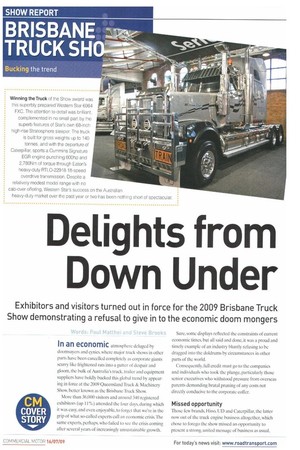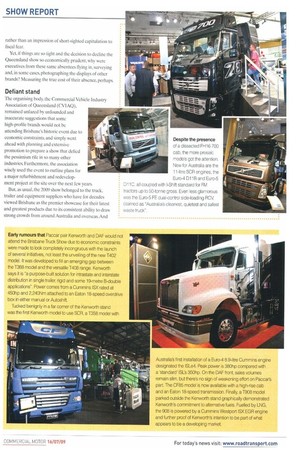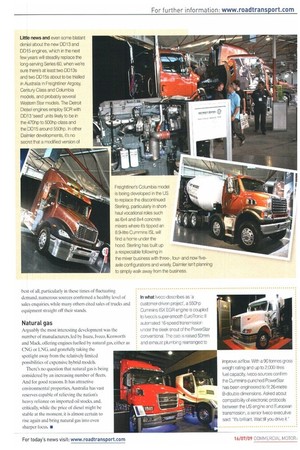elights from
Page 42

Page 44

Page 45

If you've noticed an error in this article please click here to report it so we can fix it.
CI own Under
Exhibitors and visitors turned out in force for the 2009 Brisbane Truck Show demonstrating a refusal to give in to the economic doom mongers
Words: Paul Matthei and Steve Brooks In an economic atmosphere deluged by doomsayers and cynics, where major truck shows in other parts have been cancelled completely as corporate giants scurry like frightened rats into a gutter of despair and gloom, the bulk of Australia's truck, trailer and equipment suppliers have boldly bucked this global trend by appearing in force at the 2009 Queensland Truck & Machinery Show, better known as the Brisbane Truck Show.
More than 36.000 visitors and around 340 registered exhibitors (up 11%) attended the four days, during which it was easy, and even enjoyable, to forget that we're in the grip of what so-called experts call an economic crisis. The same experts, perhaps, who failed to see the crisis coming after several years of increasingly unsustainable growth. Sure, some displays reflected the constraints of current economic times, but all said and done, it was a proud and timely example of an industry bluntly refusing to be dragged into the doldrums by circumstances in other parts of the world.
Consequently. full credit must go to the companies and individuals who took the plunge, particularly those senior executives who withstood pressure from overseas parents demanding brutal pruning of any costs not directly conducive to the corporate coffer.
Missed opportunity
Those few brands, Hill°, llD and Caterpillar, the latter now out of the truck engine business altogether, which chose to forego the show missed an opportunity to present a strong, united message of business as usual. rather than an impression of short-sighted capitulation to fiscal fear.
Yet, if things are so tight and the decision to decline the Queensland show so economically prudent, why were executives from these same absentees flying in, surveying and, in some cases, photographing the displays of other brands? Measuring the true cost of their absence, perhaps
Defiant stand
'Ibe organising body, the Commercial Vehicle Industry Association of Queensland (CVIAQ), remained unfazed by unfounded and inaccurate suggestions that some high-profile brands would not be attending Brisbane's historic event due to economic constraints, and simply went ahead with planning and extensive promotion to prepare a show that defied the pessimism rife in so many other industries. Furthermore, the association wisely used the event to outline plans for a major refurbishment and redevelopment project at the site over the next few years But, as usual, the 2009 show belonged to the truck. trailer and equipment suppliers who have for decades viewed Brisbane as the premier showcase for their latest and greatest products due to its consistent ability to draw strong crowds from around Australia and overseas. And Despite the presence of a dissected FH16 700 cab, the more prosaic models got the attention. New for Australia are the 11-litre SCR engines, the Euro-4 D11B and Euro-5 D11C, all coupled with I-Shift standard for FM tractors up to 50-tonne gross. Even less glamorous was the Euro-5 FE dual-control side-loading RCV, claimed as "Australia's cleanest, quietest and safest waste truck".
best of all, particularly in these times of fluctuating demand, numerous sources confirmed a healthy level of sales enquiries, while many others cited sales of trucks and equipment straight off their stands
Natural gas
Arguably the most interesting development was the number of manufacturers, led by Isuzu, Iveco, Kenworth and Mack, otTering engines fuelled by natural gas, either as CNG or LNG, and gratefully taking the spotlight away from the relatively limited possibilities of expensive hybrid models.
There's no question that natural gas is being considered by an increasing number of fleets. And for good reasons. It has attractive environmental properties, Australia has vast reserves capable of relieving the nation's heavy reliance on imported oil stocks, and, critically, while the price of diesel might he stable at the moment, it is almost certain to rise again and bring natural gas into even sharper focus. •




















































































































































